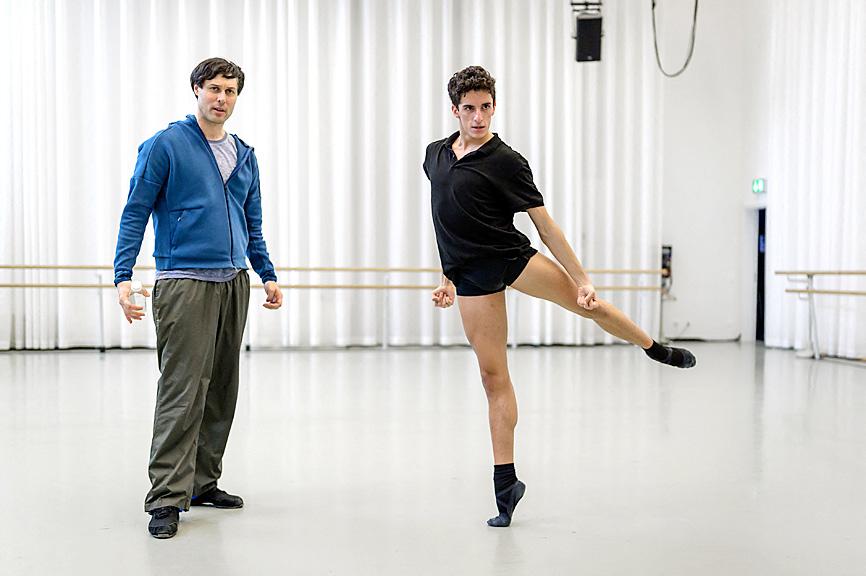Surrounded by little girls and mocked at school when he first tried ballet, it took serious determination for Luca Abdel-Nour to become the first Egyptian prizewinner at the prestigious Prix de Lausanne.
The international competition in Switzerland has been one of the leading showcases for young ballet talent since it began in 1973.
Abdel-Nour, 17, took three prizes, including second overall and the audience award, at the latest instalment in February, and hopes his success can inspire more boys from the Middle East to overcome their prejudices about dance.

Photo: AFP
Born to a French mother, but growing up in Cairo, he performed in dance and theatre shows with his school as a young boy.
He did not try ballet until he took part in a summer dance school in France at the age of 12 and an instructor told him to give it a try.
“I was like, ummm: ‘I don’t want to do ballet — it’s for girls,’” he said.
However, his mother kept encouraging him and eventually he joined a class in Egypt. He soon realized this was his passion, even if he was the only boy in the group.
“I didn’t really care if there were no boys,” he said. “People at school knew because I was open about it. I would be called names, but I didn’t care. I used to tell them: ‘You do your thing; I want to do my thing.’”
Hard work helped him to overcome his late start and by 14, he had won a year’s scholarship to a dance school in Budapest. The following year, he won a full-time place at the elite Zurich Dance Academy.
This was where things became serious: He had to relearn everything from scratch and overcome two leg injuries in his first year.
However, the work paid off at Lausanne last month.
“When they announced the finalists, I couldn’t believe it. I was on my way home from school on the train and I cried,” he said.
Abdel-Nour has accepted a place in a company, but is not yet allowed to reveal which one.
“Every step of the way was hard,” he said. “It’s hard to leave your family and not see them for long periods of time, but it was all worth it in the end.”

Chinese President Xi Jinping (習近平) is to visit Russia next month for a summit of the BRICS bloc of developing economies, Chinese Minister of Foreign Affairs Wang Yi (王毅) said on Thursday, a move that comes as Moscow and Beijing seek to counter the West’s global influence. Xi’s visit to Russia would be his second since the Kremlin sent troops into Ukraine in February 2022. China claims to take a neutral position in the conflict, but it has backed the Kremlin’s contentions that Russia’s action was provoked by the West, and it continues to supply key components needed by Moscow for

Japan scrambled fighter jets after Russian aircraft flew around the archipelago for the first time in five years, Tokyo said yesterday. From Thursday morning to afternoon, the Russian Tu-142 aircraft flew from the sea between Japan and South Korea toward the southern Okinawa region, the Japanese Ministry of Defense said in a statement. They then traveled north over the Pacific Ocean and finished their journey off the northern island of Hokkaido, it added. The planes did not enter Japanese airspace, but flew over an area subject to a territorial dispute between Japan and Russia, a ministry official said. “In response, we mobilized Air Self-Defense

CRITICISM: ‘One has to choose the lesser of two evils,’ Pope Francis said, as he criticized Trump’s anti-immigrant policies and Harris’ pro-choice position Pope Francis on Friday accused both former US president Donald Trump and US Vice President Kamala Harris of being “against life” as he returned to Rome from a 12-day tour of the Asia-Pacific region. The 87-year-old pontiff’s comments on the US presidential hopefuls came as he defied health concerns to connect with believers from the jungle of Papua New Guinea to the skyscrapers of Singapore. It was Francis’ longest trip in duration and distance since becoming head of the world’s nearly 1.4 billion Roman Catholics more than 11 years ago. Despite the marathon visit, he held a long and spirited

The pitch is a classic: A young celebrity with no climbing experience spends a year in hard training and scales Mount Everest, succeeding against some — if not all — odds. French YouTuber Ines Benazzouz, known as Inoxtag, brought the story to life with a two-hour-plus documentary about his year preparing for the ultimate challenge. The film, titled Kaizen, proved a smash hit on its release last weekend. Young fans queued around the block to get into a preview screening in Paris, with Inoxtag’s management on Monday saying the film had smashed the box office record for a special cinema